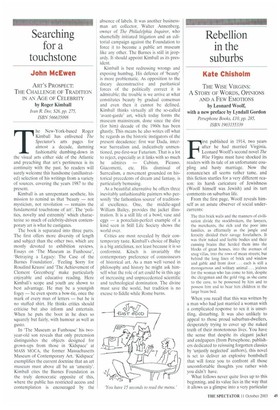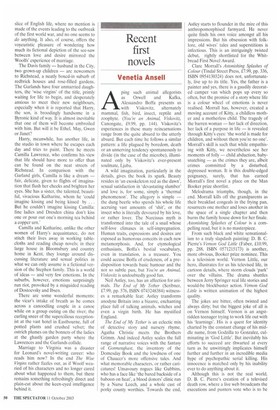Rebellion in the suburbs
Kate Chisholm
THE WISE VIRGINS: A STORY OF WORDS, OPINIONS AND A FEW EMOTIONS by Leonard Woolf, with a new preface by Lynclall Gordon Persephone Books, £10, pp, 285, ISBN 1903155339 First published in 1914, two years after he had married Virginia, Leonard Woolfs second novel The Wise Virgins must have shocked its readers with its tale of an unfortunate coupling and hasty marriage. Now the romance/sex all seems rather tame, and this fiction startles for a very different reason: its harsh caricature of Jewishness (Woolf himself was Jewish) and its tart comments on suburban life.
From the first page, Woolf reveals himself as an astute observer of social undercurrents:
The thin brick walls and the manners of civilisation divide the stockbrokers, the lawyers, the merchants, the rich and the poor into families, as effectually as the jungle and ferocity divided their savage forefathers. It was their naked and feeble bodies and their cunning brains that herded them into the blocks of great houses, into the avenues of snug villas, into the rows of mean streets; but behind the long lines of brick and window and gable and front door .. . each is still a monogamous and solitary animal . . . jealous for the woman who has come to him, despite the clergyman and the gold ring, as she came to the cave, to be possessed by him and to possess him and to bear him children in the large brass bed.
When you recall that this was written by a man who had just married a woman with a complicated response to sex it is unsettling, disturbing. It was also unlikely to appeal to those proud suburban-dwellers, desperately trying to cover up the naked truth of their monotonous lives. You have the sense that despite its elegant jacket and endpapers (from Persephone, publishers dedicated to reissuing forgotten classics by 'unjustly neglected' authors), this novel is set to deliver an explosive bombshell that will force you to confront all those uncomfortable thoughts you rather wish you didn't have. What follows never quite lives up to this beginning, and its value lies in the way that it allows us a glimpse into a very particular
slice of English life, where no mention is made of the events leading to the outbreak of the first world war, and no one seems to do anything. It also, of course, offers the voyeuristic pleasure of wondering how much its fictional depiction of the see-saw between love and desire mirrored the WooIfs' experience of marriage.
The Davis family — husband in the City, two grown-up children — are newcomers to Richstead, a neatly boxed-in suburb of redbrick houses and rose-filled gardens. The Garlands have four unmarried daughters, the 'wise virgins' of the title, primly waiting for life to begin, and desperately anxious to meet their new neighbours, especially when it is reported that Harry, the son, is broodingly handsome in a Byronic kind of way. It is almost inevitable that one of them will become embroiled with him. But will it be Ethel, May, Gwen or Janet?
Harry, meanwhile, has another life, in the studio in town where he escapes each day and tries to paint. There he meets Camilla Lawrence, who confirms his view that life should have more to offer than can be found on the neat streets of Richstead. In comparison with the Garland girls, Camilla is like a dream — fair, delicate, given to flights of imagination that flush her cheeks and brighten her eyes. She has a sister, the talented, beautiful, vivacious Katharine, whom he 'could imagine kissing and being kissed by . But he couldn't imagine kissing Camilla: fine ladies and Dresden china don't kiss one or pour out one's morning tea behind a copper urn.'
Camilla and Katharine, unlike the other women of Harry's acquaintance, do not stitch their lives away in working tablecloths and reading cheap novels; in their large house in Bloomsbury and country home in Kent, they lounge around discussing literature and sexual politics in what we can only assume is a fictional version of the Stephen family. This is a world of ideas — and very few emotions. In the suburbs, however, emotions surprisingly run riot, provoked by a misguided reading of Dostoevsky and Ibsen.
There are some wonderful moments: the vicar's intake of breath as he comes across a canoodling couple in a canoe while on a group outing on the river; the curling sneer of the supercilious receptionist at the vast hotel in Eastbourne, full of potted plants and crushed velvet; the ostrich plumes on the bonnets of the ladies at the ghastly garden party where the Lawrences and the Garlands collide.
Marriage to Virginia was a disaster for Leonard's novel-writing career: who reads him now? In the end The Wise Virgins rather fizzles out, as if Woolf wearied of his characters and no longer cared about what happened to them, but there remains something refreshingly direct and plain-cut about the keen-eyed intelligence behind it.



















































































 Previous page
Previous page